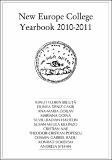New Europe College Yearbook 2010-2011

View/
Publication Date
2010Author
IONUŢ FLORIN BILIUŢĂ, DUNYA DENIZ CAKIR, ANA-MARIA GOILAV, MARIANA GOINA, SILVIU-RADIAN HARITON, SUSAN MBULA KILONZO, CRISTIAN NAE, THEODOR-CRISTIAN POPESCU, COSMIN GABRIEL RADU, KONRAD SIEKIERSKI, ANDREEA ŞTEFAN
Metadata
Show full item recordAbstract/
Between 1920 and 1940 the relationship between culture and ethnicity constituted one of the most dominant political themes in Eastern Europe. The cultural, historical, anthropological debates shaped national identity in every country in the region. After 1918 the building of the national state in East Central Europe had as a principal consequence a quest to define the nation. The political regimes engaged in an official sponsored project to define nationhood. The main reasons behind this political attitude were the inhomogeneous population inside their borderlands or the menacing strong neighbors. In the same time revisionism, political conservatism, artistic avant-garde, anti-modernism and fascism joined hands with the same purpose: to provide a right-wing definition of the nation where racial nationalistic grounds were the backbone for an exclusivist and anti-Semite ideology which eventually led to an explosive state of facts. The rise of Soviet Russia on the one hand and fascist Italy and Germany on the other hand had a tremendous effect on Eastern Europe: in the conflict between the god of the Nation and the idol of the class, the countries from the Eastern Europe attempted to avoid a political partnership with the revolutionary states and involved in different regional and international alliances. But these political alliances could not put an end to the appeal of the fascist states: it seemed that by the end of the 1930s, under the influence of the economical crises, the god of the Nation ruled over Eastern Europe, as well. This balancing situation is also true in Romania’s case. Around this confrontation in creating the national identity I construct my …
